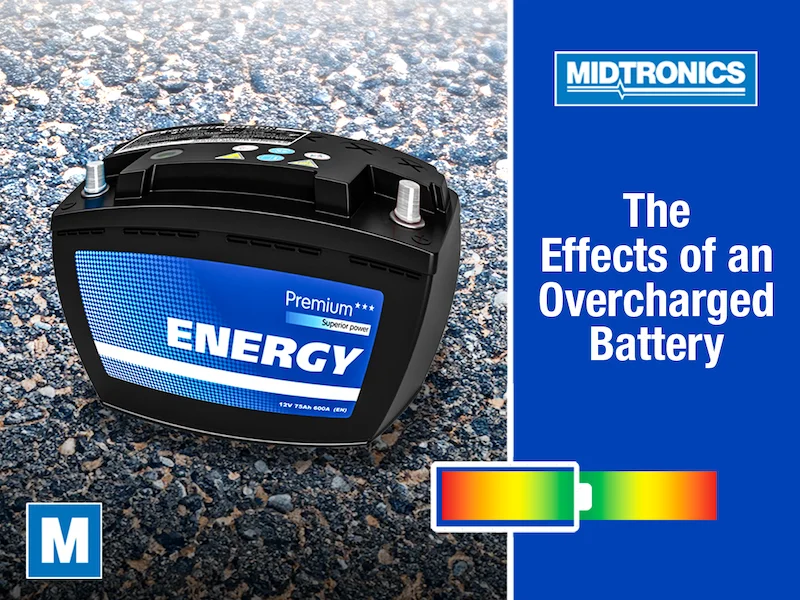If you’ve driven long enough, you’ve experienced the frustration of a car that won’t start or an electrical system that can’t be trusted. While a weak or dead battery is commonly caused by an aging battery that’s due to be changed, it’s not always the case. It could be caused by overcharging the battery.
Whether you’re a DIYer or a capable technician, an overcharged battery can be easy to miss and symptoms can steer you in the wrong direction. What happens when a battery is overcharged? What are the effects and why is this dangerous? Let’s look at why overcharging a car battery can cause damage, and learn tips on how to avoid it in the first place. We’ll explain the symptoms of an overcharged battery and delve into the technical details behind so you can stay informed about what’s going on under the hood, whether it’s your car or your customer’s.
What is Overcharging a Battery and What Are the Effects?
Overcharging a battery occurs when it continues to be charged for an extended period, even after it has reached its full capacity. While the 12-volt battery is considered to be full at 12.6 volts, it requires a higher voltage to replenish its charge once it drops – say, from a starting event. And a common charging rate is between 13.5 and 14.5 volts. So, when you’re attempting to charge a battery with more energy than it’s capable of receiving, the excess is converted into other types of energy that the system is not designed to accommodate for more than a very short time.
This can lead to all sorts of negative effects, including the reduction of battery life, safety hazards, and damage to the electrical system. Overcharging can cause the battery to produce excess heat and, in extreme cases, even explode. The most significant impact is on the battery’s life, as overcharging can significantly reduce its ability to hold a charge.
Symptoms of an Overcharged Car Battery
One common symptom of an overcharged car battery is the smell of sulfur or rotten eggs coming from under the hood. This occurs when the electrolyte fluid inside the battery is boiling, which causes a release of hydrogen sulfide gas. Additional symptoms can include:
- The dashboard warning light for the battery coming on, indicating an issue with the charging system. It’s normally indicating undercharging conditions, but it can also point to a voltage out of the normal range.
- Electrical components can malfunction or stop working altogether, including headlights, radio, and power windows. Fuses can blow, or unprotected circuits could overheat, melting wiring or causing devices to fail.
- The battery can get hot to the touch as the energy is converted to heat energy rather than chemical energy.
- The battery case can swell. Internal gases can build up and force the case to swell, or potentially crack in severe instances.
- If it’s previously been overcharged, it may not recharge to its full capacity from a combination of loss of electrolyte, structural damage, and accelerated loss of active material on the plates.
Reasons Why Overcharging Occurs in Car Batteries
A reason why overcharging occurs is due to an issue in the vehicle’s charging system, such as a faulty alternator. Specifically, a voltage regulator that doesn’t restrict voltage generation to around 14.5 or so would be to blame. Failures are often from normal wear and tear, although reversing polarity during a jump start could also cause it.
Additionally, overcharging can sometimes occur when a battery is left connected to a charger for too long, causing the voltage to increase beyond the battery’s recommended capacity. It’s the case with conventional chargers without diagnostic or regulating capabilities.
In any case, it is crucial to monitor the state of a car battery once it’s been overcharged, as it can negatively impact the battery’s lifespan and overall performance.
Long-Term Damages of Overcharging a Car Battery
Overcharging a car battery may seem harmless, but the long-term effects can be damaging. When a battery is continually charged past its maximum capacity, it can lead to a decrease in overall battery life as it has shed lead and lead dioxide, which are crucial for the battery. This means that your car’s battery will not perform as well as it used to and may leave you stranded when you need it the most.
Again, in extreme situations, a battery can explode if it’s overcharged with hydrogen gas being released. But should that occur, the electrolyte can cause severe damage to the components it contacts under the hood, not to mention the fire risk that’s associated with it.
How to Avoid Overcharging a Car Battery
To avoid overcharging, ensure that the charging system is working properly and avoid leaving the battery charging for too long. It sounds simple, but no one intends to overcharge it or neglect their car. When you’re using a battery charger, only keep it plugged in until the battery is fully charged unless it has the capability to either shut itself off or reduce its output to a trickle. While there are products on the retail market – smart chargers – that function well, a mechanic or repair shop can find professional-grade options from Midtronics.
Other things you can do include monitoring the battery’s health regularly with routine battery tests, ensuring proper connections, and avoiding exposure to extreme temperatures for longer than necessary.
Takeaways
Regular maintenance and checks are necessary to keep your battery in optimal health. A little bit of preventative care can go a long way in protecting your investment, and only using quality equipment to test and charge batteries is crucial. When you’re testing a battery, go through the extra step of a starting and charging system check to ensure the battery isn’t being subjected to more voltage than it can handle.
And when a battery needs to be put on a charger for a while, use the lowest rate you can for the longest time you can have it charging.




